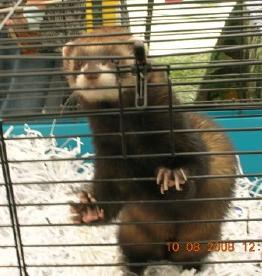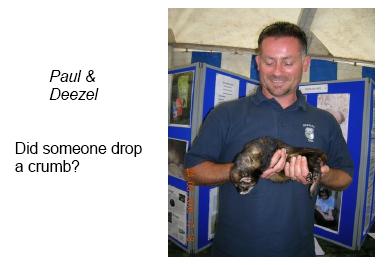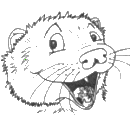Polecat, wots that then?!!
by Paul Pountain
As many of you may know I'm a bit of an anorak when it comes to our native European Polecat....in fact it's one of my biggest passions in life, apart from my ferrets, two springer spaniels and dare I say it – Portsmouth Football Club (Play up Pompey!!). I know there's more than just one of me out there!! Beats all this running around that arena at Bowood Country Show with your red shirts flying high, hey Mr Mick Quelch?!
Anyway, back to the subject in hand – polecats. A truly wonderful if somewhat misunderstood and neglected creature. Our native polecat was so badly persecuted many years ago that its numbers declined drastically during the late 1800's/early 1900's; by the mid 1930's it was recorded that less than fifty polecats remained, making them an endangered species and very nearly becoming extinct on these shores – a very sad fact indeed.
Since the early 1990's, animal conservation groups such as the Vincent Wildlife Trust (VWT) and the British Mammal Society have been dedicating a lot of their time and resources in mapping and surveying the whereabouts of these very elusive creatures – a project that I too have dedicated a lot of my spare time to – in trying to establish how well our polecat population is progressing in coming back from near extinction to our countryside.
Ferrets 2000 is a small group of passionate, enthusiastic ferret owners. We have a stand at many of the country & craft shows including Living Heritage, HD Fairs, Hamptworth Estate and the CLA, to name a few. Our main aim is to promote the image and welfare of ferrets in general and to “fly the flag” on behalf of the National Ferret Welfare Society. We have areas on our stand dedicated to all aspects of keeping ferrets -as pets or for working, but we also have an area set aside for polecat conservation and in regards to the latter, we have the best helper available to us, enabling us to bring to the fore the subject of polecats and the need for us to educate people as to what and how special these wonderful creatures are – Deezel!
Deezel was an orphaned baby polecat who was brought into a local wildlife hospital very close to where I live in Wiltshire. Two seasons ago when he was a kit, two women were walking their dogs along a quiet country lane and noticed this small dark creature keep scampering across the lane in front of them with something in its mouth – this happened on several occasions until unfortunately one of the dogs in its excitement, barked just as this small animal was running across the clearing in front of them. Out of curiosity, the two women walked up to what had been dropped and noticed this very tiny dark 'rat like' looking creature on the grass. The two women then did exactly the right thing at that time.....left it there in the hope that the mother would return to collect it.
Some four hours later, one of the women thought she would go back just to check and to her astonishment it was still lying there. By this time the weather had turned for the worst and began to rain so she 'grabbed the bull by the horns' and made the decision to pick up whatever it was and contact the local wildlife hospital.
The following day I received a call from Marilyn who runs this wildlife hospital saying that yesterday a lady had brought in a baby ferret – was there anything I could do to help them with it? (Of course, being the only local ferret man the phone never stops ringing – all you ferret rescues out there know what I mean!!) so I said I would pop over that afternoon just to cast my eye over the little critter to see roughly how old it was and possible ways forward.
To my amazement when I called in the little critter was around 4 – 5 inches in length and had a belly like Mr Quelch (ouch...that's gonna hurt!), was covered in dense black suede like fur with white tips to its ears and a small white muzzle – it was still deaf and blind!
Straight away I told her that my gut instinct was “that's no ferret you've got there...that's a polecat”. At that point panic set in! “What do I do with a wild polecat kit?” exclaimed Marilyn. “I don't know, you're the WILDLIFE Hospital” said I helpfully.
At the end of our short, frenzied discussion we calmed down and after giving it some thought made the decision based on my ferret experience, on the best way forward. Marilyn is an extremely dedicated person and set to caring for this baby polecat; she successfully nursed him to the stage of his ears and eyes.
My turn! A couple of weeks later Marilyn called to ask if I could take his care over as the hospital was becoming quite busy. “No problem” I said, “let's get him home”. I carried on the hand rearing process of weaning him onto solid food. He grew more and more in size and strength each day and his eyes and ears fully opened to the extent that every time he heard and saw you he got so excited that he used to climb the bars of his 'nursing' cage and launch himself from the top onto your chest, (or whatever he could grab – bare skin normally!). We named him Deezel as he had the energy of a locomotive so I'm afraid the name stuck.
Days lead to weeks and weeks to months and Deezel grew into a very stunning mature polecat. Now I can hear you say – “wild polecat – has he been released....?”.
Due to his upbringing we had to very carefully decide on what to do so I contacted – Dr Johnny Birks of the VWT, who in my opinion are the most knowledgeable of bodies with regards to polecats.
 We spoke/emailed each other at considerable length as to what would be the best way forward for Deezel, eventually deciding to keep him captive but in the most natural environment possible for him, as we both didn't like the fact of him being released and possibly falling foul to human persecution due to his tameness and friendliness.
We spoke/emailed each other at considerable length as to what would be the best way forward for Deezel, eventually deciding to keep him captive but in the most natural environment possible for him, as we both didn't like the fact of him being released and possibly falling foul to human persecution due to his tameness and friendliness.
One day Dr Birks emailed me to ask if he could come visit and see Deezel for himself in order to photograph and verify him for his and the latest polecat survey records. Of course I was delighted and very appreciative so arranged a convenient date for us to meet. He traveled from Herefordshire and called in on his way to a talk near the New Forest.
Upon seeing Deezel for the first time, he said what a stunning example of a polecat he was and how well we had managed to nurse him from his young age when found, to the stage he was now at in his life. Deezel has now been verified as 100% polecat and features in the latest edition of the “2004-2006” Polecat survey of Great Britain, so if anyone wants to see him turn to page 28! http://www.vwt.org.uk
If anyone travels to any of the country shows, craft & game fairs, village fetes and school talks that Mick and I attend, along with the rest of our friendly team then please call into our stand. Deezel is normally with us as he is our focal point when talking to people, explaining to them what polecats truly are, what they unfortunately went through in past years and how we nearly lost them through extinction in this country. As Dr Johnny Birks so kindly said – and I
 hope agree once you have seen him -what a stunning creature he is and why polecat conservation is so important – especially to me, because if we ever lost an animal so magnificent as our native polecat then it would be an absolute travesty for all concerned. To those who have taken the time to fill in and return your survey report during these last few years to the VWT then from me personally, I thank you all.
hope agree once you have seen him -what a stunning creature he is and why polecat conservation is so important – especially to me, because if we ever lost an animal so magnificent as our native polecat then it would be an absolute travesty for all concerned. To those who have taken the time to fill in and return your survey report during these last few years to the VWT then from me personally, I thank you all.
Although I have kept and lived with ferrets now for many years, I do not regard myself as an expert or as a professional in studying polecats. All that I have written is based purely on my own personal experiences, opinions, books I have read and the knowledge taught to me by others; to name but a few: Mick Quelch, Mike Withers, John Chitty (my vet), Simon Whitehead and Dr Johnny Birks. I never got to properly meet one of the best, Mr Tom Sturgess but I'm told he was a true gent and countryman who loved ferrets through and through.
This subject is a passion very close to me. The more of us who can play a part out there to help the cause of the polecat to establish itself as it once was; back to being abundant in great numbers, native to our glorious countryside is a bonus.
Paul & Deezel
